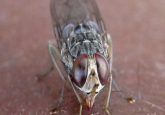The fungicide-resistant pathogen causing trouble among the tulips

Eight strains of azole-resistant Aspergillus fumigatus (A. fumigatus) – a pathogenic fungus that infects humans – have been identified on a tulip bulb imported to Japan.
A. fumigatus is an opportunistic fungal human pathogen currently rising in global prevalence, causing an increase in fungal infections such as pulmonary aspergillosis (PA). Recent findings have, in particular, highlighted a potential surge in influenza-and COVID-19-related PA cases.
The conidia spores of A. fumigatus are widely found in the environment and are thought to be inhaled daily. Individuals with weakened immune systems are at risk of developing a fungal infection when exposed to the pathogenic spores. Alongside prevalence, the dangers associated with these infections are also increasing due to an increasing resistance to antifungal drugs.
PA infections are commonly treated by the antifungal drugs known as azoles; however, this class of drug is also used as a fungicide in agriculture. It is hypothesized that over the last decade, environmental exposure of A. fumigatus to azoles and other fungicides in agriculture has promoted the development of fungicide-resistant strains.
Hitchhiker’s Guide to the Galaxy: the microbes that visit Mars
Microbes were launched into the stratosphere of Earth, where the conditions are similar to those on Mars, and their endurance was monitored. The study could provide information on the impact microbes have on space missions, as well as the possibility of outsourcing resources from Earth.
The study aimed to tackle this problem by exploring how this fungicide resistance occurs in the environment. “Understanding how the genetic variation linked with azole resistance in A. fumigatus strains is distributed and enriched in the environment is necessary for suppressing resistant strains. In this study, we set out to do this by investigating the genetics of those strains” Hagiwara explained.
The authors used genome sequencing and comparative analysis to investigate eight strains of azole-resistant A. fumigatus isolated from a single tulip bulb in Japan. The strains were typed by microsatellite typing, single-nucleotide-polymorphism profiles, and mitochondrial and nuclear genome analyses to compare sensitivity to agricultural and medical azoles between the different strains. The results revealed that genetic recombination had previously taken place between the strains and some even showed resistance to other fungicides such as Qol and carbendazim.
“Our results show that plant bulbs provide not just a vehicle for this pathogen, but also an ideal niche for its strains to encounter each other, and to evolve their resistance to drugs,” commented Hagiwara. In all, this study provides valuable genetic evidence of emerging fungicide resistance within the environment and will help the global One Health challenge elucidate answers to this growing problem.






